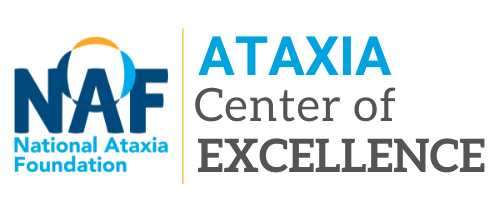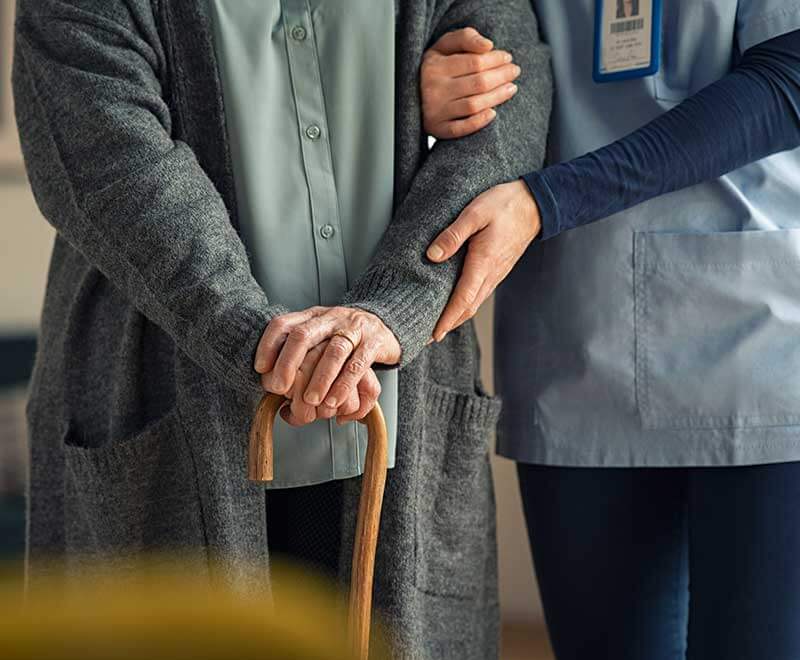The Johns Hopkins Ataxia Center offers a multispecialty approach to the diagnosis and treatment of cerebellar ataxia. We work with patients whose ataxia symptoms are worsening over time to offer long-term care and help navigating the symptoms and underlying conditions. The large number of patients we treat gives our specialists exceptional expertise in assessing, diagnosing and treating the full range of ataxia symptoms. Our specialists are researcher-clinicians who incorporate the latest scientific findings on ataxia into your treatment plan.
Learn more about:
Why Choose Us | Our Team | Appointments | Events and Support Groups | Research | Locations | Newsletter
Johns Hopkins Ataxia Center | Overview
The center was founded by and continues to be supported thanks to philanthropic investments from the Gordon and Marilyn Macklin Foundation and with the advocacy of the National Ataxia Foundation.
Why Choose Johns Hopkins for Ataxia Care
Many patients have been told that ataxia is untreatable. However, with the right adaptive devices, the right medical advice, judicious use of medications, proper exercise, and patient and caregiver education, we can substantially improve the quality of life for our patients.
Multi-Specialty Approach
Our neurologists are familiar with the nuances of ataxia and related disorders. They work closely with other specialists to offer a whole-person assessment and treatment.
Convenient Appointments
We strive to have patients seen by experts from a variety of specialties in one clinic on the same day. Learn more about what to expect at your appointment.
Patient Education
A big part of our mission is public and physician education. Our patients have access to educational resources, activities and support groups about ataxia, and have an opportunity to participate in scientific studies and join in our quest to better understand and treat ataxia.
About Ataxia
Ataxia is an abnormal lack of coordination that can cause a stumbling gait, difficulty with fine motor activities, and vision and sometimes speech problems. Ataxia is a symptom that can occur with a range of health problems, including vitamin deficiencies and genetic mutations.
Learn more about ataxia.Events and Support Groups
Ataxia Center Support Group
Our support group meets monthly on Tuesdays 1-2 p.m. ET via Zoom.
- 2024 upcoming meeting dates: 4/9, 5/14, 6/11, 7/9, 8/13, 9/10, 10/8, 11/12, 12/10
- Log in via Zoom
Thrive Together on Thursdays Wellness Series
This series aims to provide ataxia patients with education, information and resources that will help individuals positively manage their condition and improve their overall quality of life.
Other Programs
For other ataxia programs in your area, please visit the National Ataxia Foundation.

Center of Excellence
Our center has been designated as an Ataxia Center of Excellence by the National Ataxia Foundation in recognition of the comprehensive ataxia care we provide.
Patient Videos
What is pediatric ataxia?
Ask the Ataxia Expert with Dr. Liana Rosenthal
Cerebellar Ataxia Exercises
Ataxia and Cognition
Learn about ataxia support services
Genetic Counseling
Occupational Therapy
Speech-Language Pathology
Ataxia Research
-
Dr. Zee's laboratory has a major research focus on the cerebellum and its role in control of eye movements. His group is specifically interested in how the cerebellum contributes to normal learning new motor behaviors, and to adaptation to disease in the eye movement system. Their overarching goals are to understand how the brain learns and how learning might be promoted in patients, and especially cerebellar patients, to improve their vision and ability to move their eyes accurately. Their research tools include the study of eye movements of normal subjects and cerebellar patients, the study of learning processes in normal subjects and cerebellar patients, and how artificial stimulation of the cerebellum might improve eye movement control and improve visual function.
-
The work in the Shadmehr Lab uses mathematics, robotics, and brain imaging to precisely quantify the function of the cerebellum during voluntary movements. The lab has developed specialized equipment to examine movements of the arm and the eyes. The aim of the work is to not only better understand the basic function of the cerebellum, but to help cerebellar patients recover some of the lost function through focused training of the remaining, healthy portions of the brain.
-
Dr. Bastian and her colleagues study the movements of adults and children who have cerebellar damage or disease. Her group is interested in understanding why movement patterns become faulty (ataxic), as well as if and why different treatments can mitigate ataxia. She is also actively studying how new movements are "learned" in individuals with and without ataxia.
Her lab employs several techniques to quantify movement including: 3-dimensional tracking and reconstruction of movement, recordings of muscle activity, force plate recordings, and calculation of joint forces and torques. These techniques allow for very precise measurements of many different types of movements including: walking, reaching, leg movements, hand movements and standing balance. The quantitative information gained from her studies make it possible to detect very small changes in movement performance over time or with treatment.










